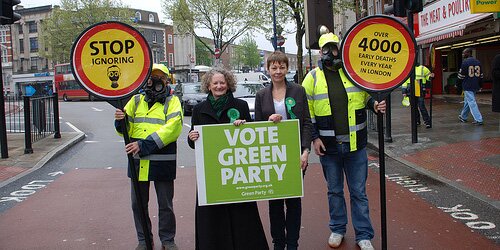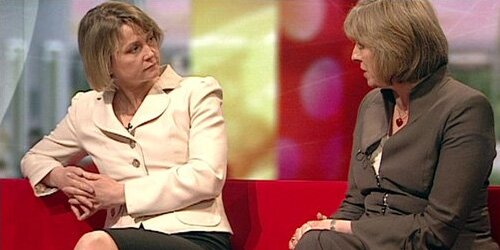Recent Health Articles
Opening Of First Abortion Clinic Sparks Protest In Northern Ireland

The first clinic offering abortion in Ireland opened it’s doors in Belfast today amidst protests from Catholics and Protestants.
The Marie Stopes family planning centre will offer the abortion pill to women under nine weeks pregnant-if doctors determine that they’re at risk of death or long term health damage from their pregnancy, in accordance with legislation in Northern Ireland. The centre will also provide contraception, emergency contraception, HIV & STI testing and ultrasounds.
More than 300 people opposed to abortion under all circumstances took the opportunity to protest outside the clinic hours ahead of it’s opening on Thursday morning, with placards reading “Keep Ireland Abortion Free”. They demanded that the centre be shut down to prevent it from becoming a beachhead for expanding abortion rights in Northern Ireland.
The leader of anti-abortion group ‘Precious Life’, Bernadette Smyth, said “We’re in 2012. Women’s health is not in danger. Women are not dying because they can’t get abortions.”
Liam Gibson from the Society of the Protection of Unborn Children called on Belfast police to arrest the clinic’s staff if they provide women with information about abortion services in Britain. Approximately 5,000 women travel to Britain from Ireland and Northern Ireland each year.
23 year old Suzanne Lee, a student from Northern Ireland, illegally ordered the abortion pill over the internet last year. She said that she would have liked to have been able to visit a Marie Stopes clinic for medical support when she self-administered the medication at six weeks of pregnancy. She described taking the pill as “quite an ordeal to go through.” It involved “severe cramping, a lot of bleeding. I bled for four weeks after it.” Lee expressed disgust that people “believe I should spend life in prison for what I did.”
Officials from Marie Stopes said that they have already been deluged with calls from women, including Republic of Ireland residents, seeking appointments. However, due to the legal restrictions in Northern Ireland, they were expecting to provide relatively few abortions.
Vice President of Marie Stopes, Tracey McNeill said “Mostly what we’ll be doing is offering advice. Many of the people we see we won’t be able to treat, because of the legal framework,” adding that as long as patients weren’t harassed and intimidated, she had no problem with the protestors. “It’s important that people express their views in a democracy.”
A sensible policy on drugs could be Nick Clegg’s legacy
Whenever there’s a new, in-depth, excellently researched and extremely carefully worded report released which calls for a reform of our increasingly antiquated drug laws, it’s always worth going and seeing what the Daily Mail has written about it.
The UK Drug Policy Commission’s final report has then, as you might have expected, been giving the Mail treatment. Their article, which doesn’t feature on the voluminous front page of their website, does the classic trick of misrepresenting the report by picking on one comparison it uses.
Hence the Mail’s report claims the report says “smoking cannabis is just like eating junk food”, when it naturally says nothing of the sort. What it does say is (on page 108, PDF):
A small but significant segment of the population will use drugs. We do not believe that pursuing the goal of encouraging responsible behaviour means seeking to prevent all drug use in every circumstance. This is not to say that we consider drug use to be desirable. Just like with gambling or eating junk food, there are some moderately selfish or risky behaviours that free societies accept will occur and seek to limit to the least damaging manifestations, rather than to prevent entirely.
The Mail quotes the second half of the paragraph, but not the first part which makes clear why they’re making the comparison. Much of the rest of the Mail’s report is a fair summing up of the UKDPC’s conclusions, but it’s the headline and opening sentence that as always set the tone.
It’s a great shame, and shows exactly the hurdles that still need to be leapt through to get anything approaching sensible coverage of calls for drug law reform, especially as the report’s conclusions are thoroughly conservative and incremental rather than revolutionary.
It doesn’t advocate the decriminalisation of all drugs, let alone their legalisation; what it does suggest is that the possession of a small amount of a controlled drug could be made a civil rather than a criminal offence, leading to fines and referrals to drug awareness or treatment sessions rather than sanctions through the criminal courts.
Similarly, it suggests that either decriminalising or altering the sanctions for the growing of cannabis for personal use could strike a blow against the current situation where empty houses or warehouses are rented or broken into and used by criminal gangs to grow the high-strength strains of the drug that have caused such concern over recent years.
More optimistically, it calls for a cross-party political forum to be set up to examine where drug policy to go from here. Sadly, even if one were to be created, should it come up with the “wrong” conclusions and proposals then it’s highly unlikely it would get us any further.
With both the main parties clearly wedded to prohibition, regardless of how this report has apparently been welcomed even by the likes of Jack Straw, ideally there should be someone from the third party with a high profile who could make a break with the failed policies of the past by being clear about where we’ve been going wrong for so long.
Want a legacy that could eventually underline your role in the coalition, Nick?
The right to talk about abortion
contribution by Emma Poole
I feel like I’ve been challenged. Mehdi Hasan said that no other lefty with “pro life” thoughts would dare write about this.
We live in a male dominated society and we have men joining the discussion (which I believe they have a right to) and we have a situation where the final decision will most likely be made by be a man (which I am not keen on at all).
He was accused of being sexist because his piece seemed like a judgement that he knows better than women about the decisions that affect their lives.
Let me be clear: I am pro choice. I feel for women making that decision but I also feel that the sooner it is made the better. Excepting, of course, the extenuating circumstances that do happen: i.e. finding out late after a rape or by a perpetrator of domestic violence. This option must stay available for these kind of situations.
But it is a woman’s right to choose what happens to her body. It is her choice to become a mother. It is her choice how and when that happens.
I am a human being that feels sympathy for an unwanted unborn child but I feel sympathy for those women thinking about what’s best too.
They’re the ones who have to live with it. They’re the ones who would have to live with it if the choice was taken from them.
I have never had to make this decision. I have never felt that kind of upset at the prospect of motherhood and I hope I never do. None of the men in the discussion have or will, and neither will the current health secretary.
I will not judge that choice. I will not impose my view (by changing the law) and I will not tell them they are wrong about their lives. And neither are any of the other participants in a place to do so.
Campaigners Win Victory Against Atos Assessments

Thousands of disabled people in Scotland will be spared from Atos assessments in what’s been described as a ‘humiliating climbdown’ for the firm.
After a sustained campaign from Scottish media, Atos have agreed to subcontract assessments for the new Personal Independence Payment to Salus, the occupational health arm of NHS Lanarkshire. As they are a social enterprise, profits from outside contracts will be ploughed back into patient care.
Personal Independence Payments are due to replace the Disability Living Allowance next year. Atos were due to earn up to £40million pounds in taxpayers money for the assessments.
However the firm will continue to carry out “work capability assessments” in Scotland for employment and support allowance.
A spokesperson for Citizens Advice Scotland congratulated campaigners on their success, and remarked that “We have always said the system is unfit for purpose.” CAS have received over 24,000 calls complaining about the IT firm’s assessments.
Tom Greatrex, Labour MP for Rutherglen and Hamilton West, has been a leading campaigner against Atos assessments. He said “This is a humiliating climbdown by Atos.”
“By subcontracting this work to the NHS, Atos are effectively acknowledging that the public don’t trust them to do the assessments fairly.”
However, as Atos are still the the overall holders of the assessment contract, Greatrex added that “We need reassurance from Atos that the views of experienced NHS doctors and nurses will be given sufficient weight, rather than being dismissed as often happens with work capability assessments.”
A company spokeswoman for Atos said the Salus deal was “a new approach, working in partnership with NHS Lanarkshire”.
“[PIP assessments] will be conducted by health practitioners with first-class expertise in dealing with the needs of disabled people.”
Report details how the BBC buried negative news on the NHS Bill

OpenDemocracy’s ourBeeb project have published a report which details how the BBC has failed in its responsibilities to inform the British public about the truth surrounding the highly controversial NHS Bill.
Titled: How the BBC betrayed the NHS: an exclusive report on two years of censorship and distortion, it gives a thorough account of a silence around the NHS bill within the BBC.
It details the apparent keenness of the BBC to follow the government’s positive privatised NHS spiel (The…Bill will allow GPs to get control … of the NHS budget) and ignore the many reports that tell a whole new, accurate story.
They say that on the day the Health and Social Care Act was approved and passed through the House of Lords (19th March 2012), not one article was published on the BBC’s online news page on the NHS.
Similarly, the BBC failed to report that former Health Secretary, Andrew Lansley, received £21,000 to his personal office from John Nash the then chairman of Care UK – a health firm with a substantial income from the NHS. Nash also founded Sovereign Capital which runs a number of private health firms.
The Daily Mail reported on the business activities of Andrew Lansley’s wife, Sally Low. ‘Low Associates’ which was found to be boasting of its ability to help ‘make the link between the public and private sectors’ – sounds familiar.
Labour MP Grahame Morris said it constituted a “clear conflict of interest” and suggested Lansley’s position was no longer tenable. This still failed to make a ripple of news within the BBC.
A number of unreported stories follow a similar tone including a story from Liberal Conspiracy which reported that the University Hospital of North Staffordshire (UNSH) had been charging A&E patients for any drugs they needed.
The report notes the BBC have refused an FOI request to find out how many complaints have been made about the lack of news surrounding the NHS bill.
The report also highlights a strange influx of reports from the BBC after the NHS bill had safely been passed through the House of Lords.
Besides the live streams on Democracy Live, the climax of one of the most controversial bills in recent history merited not a single article. With the bill safely passed, however, the next day saw a stream of seven articles.
The report focuses on mainly the output of BBC Online, in its news and analysis.
It concludes: “It is not in the government that the strength of the BBC lies – a parliamentary system captured by forces inherently opposed to its existence – but in the British public, the support of which it should rigorously protect.”
Do the Libdems really want to penalise ‘undeserving patients’?
Joe Farrington-Douglas tweeted last week an article on Lib Dem Voice posted at the time that Norman Lamb took over the Lib Dem health brief.
Lamb wrote a paper about his thoughts and followed up with interviews with newspapers. In particular Lamb said:
If you get rat-arsed on a Friday night and get taken to A&E where you are foul and abusive to staff, is it right for the taxpayers to fund your life-saving treatment?
The implication being that it isn’t and we shouldn’t and hence there should be a charge for A&E in these circumstances.
The Guardian said:
He called for wide public debate on whether the community should pay for the excesses of the individual. There was a strong case for charging drunks for stomach pumps or treatment of injuries, and pubs and clubs should also be made to contribute if their complicity could be proven.
This is not only wrong, but it is very unliberal.
Lamb was suggesting that we create a concept of deserving patient and undeserving patient. Under Lamb’s plan the undeserving patient has to pay for their treatment. Where does it stop? Do we charge smokers for their treatment? Do we charge drunk drivers for the injuries they receive, or the injuries they cause?
What happens if someone is foul and abusive but sober? Is Lamb concerned with people’s behaviour, or their condition? If a person does something illegal (they are foul and abusive to A&E staff) then the legal system can be used: they will be punished for their behaviour.
But what if they are drunk but polite, do those drunks get a discount, or get the treatment free? Who decides what is foul or abusive, will there be national standards or will some areas be allowed to be more sensitive? What if the patient has mental health issues which is the cause of the abusive behaviour and is unrelated to the alcohol they consumed?
The whole idea was poorly thought out.
It didn’t matter that this policy was unworkable because Lamb wanted to get a different message out to the public. The message came straight out of the Lib Dem’s Orange Book. Lamb wants to deliberately break the cherished free-at-the-point-of-delivery principle of the NHS.
Once you start charging for treatment, regardless of the reason, that principle has been broken and charges will spread throughout the NHS. Imposing charges will encourage the development of an insurance market. Insurance companies will produce products so that you pay a small premium every month (say, for the cost of 5 pints) and the insurance company will pay your A&E bill if you get injured when rat-arsed.
Such ill-thought-out policies are fine for a spokesperson for a party that will never be elected, but these were the policies of Norman Lamb, who was just appointed Minister of State in the Department of Health. It is a cause for concern for health policies in the future.
Jeremy Hunt’s views on Homeopathy aren’t the real scandal here
contribution by Louise Mead
Jeremy Hunt’s appointment as Health Secretary: you really couldn’t make it up.
There are plenty of reasons why his appointment should cause concern, not least his apparently anti-choice attitude to women – made clear when he voted in favour of reducing the abortion time-limit from 24 to 12 weeks.
This is partly why it was disappointing to see certain voices on the left skipping over serious arguments against his appointment in favour of the claim he ‘believes in homoeopathy’.
continue reading… »
Emails: Lansley’s own advisers said the NHS Bill would increase bureaucracy
Remember that we were promised before the last election that a Conservative government would bring in the post-bureaucratic age?
Well, there is little evidence that is what we have got, and there is a lot of evidence that we are going in the opposite direction: getting more bureaucratic.
For example, the botched NHS reforms have created two new levels of bureaucracy.
continue reading… »
Why is the government keen not to upset the drinks lobby?
It is stating the obvious to say that this cabinet of millionaires is too close to banks and big business. But in terms of alcohol policy, this closeness is costing lives. We have known for a long time now that alcohol, when used to excess, can have a devastating impact on people’s lives.
It kills 6,500 a year (that’s 3 times more than die on our roads), costs the NHS £3.5bn a year (3% of the NHS budget) and the social impacts are numerous.
You would think then that the priority for Andrew Lansley and the Department of Health would be saving lives and cutting cost to the NHS.
continue reading… »
Why is Michael Gove so close to Christian extremists from LoveWise?
A government backed Christian charity called Lovewise teaches school children that most rape victims ‘regret abortion’.
According to Dina Rickman, the charity also teaches children that abortion causes holes in the womb, depression and infection.
LoveWise also describes homosexuality as “damaging to mind, body and spirit” in its code of practice.
continue reading… »
NEWS ARTICLES ARCHIVE




















